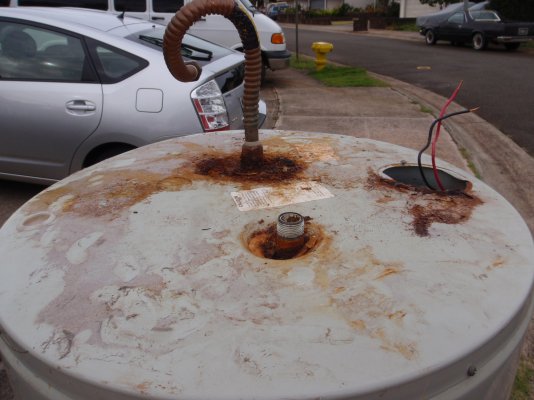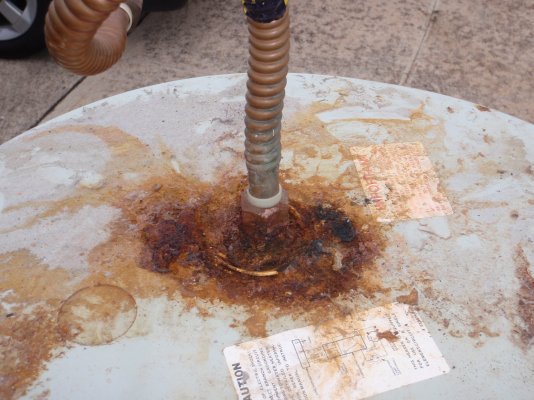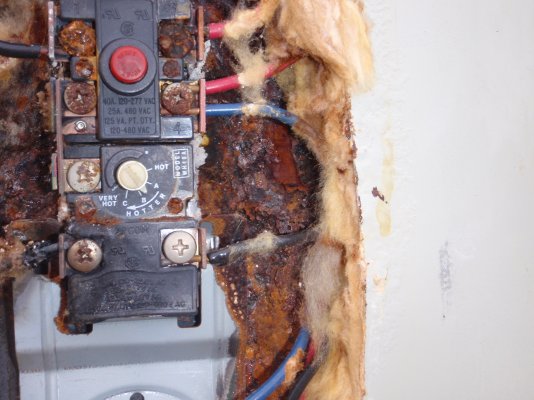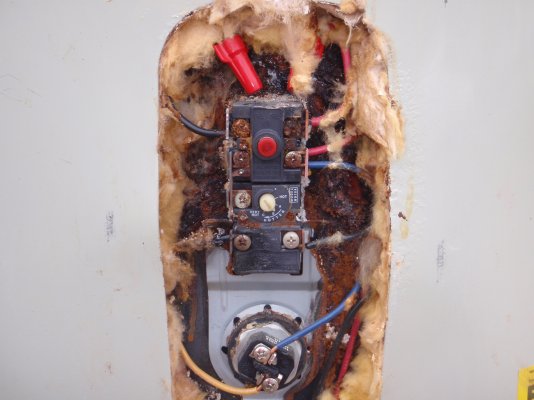(Another episode in the endless epic saga of "Whaddya DO all day?!?")
Spouse and I have been friends with another military couple for decades. They're on the Mainland for a few years so we're looking after their local home & tenants.
The tenants, oddly enough yet another military couple, are good people but largely clueless on home maintenance. Her spouse is in Iraq for another six months so of course the 15-year-old house has decided to kick off its midlife crisis. In the last six months we've dispatched a leaky refrigerator water valve, a clogged dryer vent (http://www.early-retirement.org/forums/f27/how-clean-is-your-dryer-exhaust-38568.html), a broken dryer timer switch, a balky shower door, a worn-out dishwasher, and an incredible hairball in a plumbing drain. She's getting better with the basics but she has a full-time job, the parents-in-law have been visiting, other friends & family have made snowbird trips, and it's been a stressful/busy time.
The other night she had no hot water from their 10-year-old electric water heater. Next morning there was still no hot water so she called us. We talked about puddles, shut valves, and tripped breakers-- no obvious problems. So we drove on over with all our water-heater tools.
The water heater's connections had extensive and impressive corrosion around them. ("Oh, I think it's always been like that.") When I took off the thermostat cover, the insulation was dripping wet. Ruh-roh. The house electric panel's circuit breaker was shut so I reset the heater's thermal overload, which felt like it was grinding against sand. No click, no reset. I rotated the setting on the thermostat to try to get the heater to turn on-- nothing. Double ruh-roh. I strapped on my headlight for a better view in the dim garage (g#$%^mn presbyopia) and noticed that the entire thermostat was surrounded by more corrosion.
It's not easy to see the details of black plastic on dark brown rust, so I decided to take a closer look at it. I asked my spouse to go over to the electric panel and open the breaker for the water heater. It's hard to read the numbers stamped on the panel (she's g#$%^mn presbyopic too) so we were talking about which breaker to open. As we discussed it I noticed a reflection from my headlight inside the thermostat, but when I leaned closer to look at it I realized that the reflection was actually little sparks flashing around a terminal. As I backpedaled, the terminal wire's insulation began to glow, then it got brighter & bigger, and then the surrounding fiberglas insulation started to smolder.
As they say in the submarine force, "communications formality began to deteriorate".
Spouse: "Oh, I see the numbers now. #17, right?"
Me: "Yes, open the breaker!"
Spouse: "What's that funny smell?"
Me: "It's the water heater-- open the breaker now!!"
Spouse: "You want me to open it now?"
Me: "Yes, right now!!!"
Spouse: "OK, I'm opening it."
Me (getting frustrated): "Fire in the water heater!!"
Spouse: "Uh-oh. (*click*)"
Me: "The fire is out!"
As the smoke cleared from the charred fiberglas (is that stuff supposed to burn?) I noticed that the lower left corner of the thermostat was melted. I guess the water had finally shorted it out the night before and when I started tweaking it I probably made even more connections to ground-- although one of them had enough resistance to start the fire.
We drained the tank but it still had 50 pounds or so of water in the insulation. As we pulled the heater off the stand we could see all the water stains below & around it. I couldn't get the anode rod out and the cold-water inlet just crumbled away when I put the Ford wrench on it. I don't know how it managed to hold pressure, even if it had already started leaking. The water heater is 10 years old and I doubt it's ever had its anode rod replaced. I guess the rod corroded away as designed, but with nothing else to stop the galvanic process then the water inlets corroded next (along with the relief connection and both heater elements) and the corrosion finally worked its way into the electrical components.
So… how's your anode rod?
How to Change a Water Heater Anode Rod | Video | Water Heaters | This Old House
Spouse and I have been friends with another military couple for decades. They're on the Mainland for a few years so we're looking after their local home & tenants.
The tenants, oddly enough yet another military couple, are good people but largely clueless on home maintenance. Her spouse is in Iraq for another six months so of course the 15-year-old house has decided to kick off its midlife crisis. In the last six months we've dispatched a leaky refrigerator water valve, a clogged dryer vent (http://www.early-retirement.org/forums/f27/how-clean-is-your-dryer-exhaust-38568.html), a broken dryer timer switch, a balky shower door, a worn-out dishwasher, and an incredible hairball in a plumbing drain. She's getting better with the basics but she has a full-time job, the parents-in-law have been visiting, other friends & family have made snowbird trips, and it's been a stressful/busy time.
The other night she had no hot water from their 10-year-old electric water heater. Next morning there was still no hot water so she called us. We talked about puddles, shut valves, and tripped breakers-- no obvious problems. So we drove on over with all our water-heater tools.
The water heater's connections had extensive and impressive corrosion around them. ("Oh, I think it's always been like that.") When I took off the thermostat cover, the insulation was dripping wet. Ruh-roh. The house electric panel's circuit breaker was shut so I reset the heater's thermal overload, which felt like it was grinding against sand. No click, no reset. I rotated the setting on the thermostat to try to get the heater to turn on-- nothing. Double ruh-roh. I strapped on my headlight for a better view in the dim garage (g#$%^mn presbyopia) and noticed that the entire thermostat was surrounded by more corrosion.
It's not easy to see the details of black plastic on dark brown rust, so I decided to take a closer look at it. I asked my spouse to go over to the electric panel and open the breaker for the water heater. It's hard to read the numbers stamped on the panel (she's g#$%^mn presbyopic too) so we were talking about which breaker to open. As we discussed it I noticed a reflection from my headlight inside the thermostat, but when I leaned closer to look at it I realized that the reflection was actually little sparks flashing around a terminal. As I backpedaled, the terminal wire's insulation began to glow, then it got brighter & bigger, and then the surrounding fiberglas insulation started to smolder.
As they say in the submarine force, "communications formality began to deteriorate".
Spouse: "Oh, I see the numbers now. #17, right?"
Me: "Yes, open the breaker!"
Spouse: "What's that funny smell?"
Me: "It's the water heater-- open the breaker now!!"
Spouse: "You want me to open it now?"
Me: "Yes, right now!!!"
Spouse: "OK, I'm opening it."
Me (getting frustrated): "Fire in the water heater!!"
Spouse: "Uh-oh. (*click*)"
Me: "The fire is out!"
As the smoke cleared from the charred fiberglas (is that stuff supposed to burn?) I noticed that the lower left corner of the thermostat was melted. I guess the water had finally shorted it out the night before and when I started tweaking it I probably made even more connections to ground-- although one of them had enough resistance to start the fire.
We drained the tank but it still had 50 pounds or so of water in the insulation. As we pulled the heater off the stand we could see all the water stains below & around it. I couldn't get the anode rod out and the cold-water inlet just crumbled away when I put the Ford wrench on it. I don't know how it managed to hold pressure, even if it had already started leaking. The water heater is 10 years old and I doubt it's ever had its anode rod replaced. I guess the rod corroded away as designed, but with nothing else to stop the galvanic process then the water inlets corroded next (along with the relief connection and both heater elements) and the corrosion finally worked its way into the electrical components.
So… how's your anode rod?
How to Change a Water Heater Anode Rod | Video | Water Heaters | This Old House




